
In November 2004, 15 German pedagogues visited Israel as part of a exchange project. This trip was laced with highlights, but a very special event was a meeting with Hannah Pick-Goslar. Besides conversations about her present life and her memories of the Holocaust Hannah Pick-Goslar told about her childhood friend, Anne Frank.
These conversations were edited for a book. In the memories the impressions of Hannah Pick-Goslar about the fate of the Jews reflect.
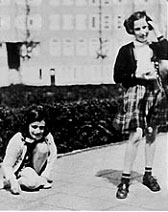 Anne writes in here diary: “Why did God let me, Anne, live and why is my best friend probably dead?” And I am sitting here today, I have got 11 grandchildren and 1 great-grandchild. Anne did not even became 16 and had to die, only because she was born a Jewish child. That is the reason why I am obliged to tell about Anne and therefore tell about the holocaust.
Anne writes in here diary: “Why did God let me, Anne, live and why is my best friend probably dead?” And I am sitting here today, I have got 11 grandchildren and 1 great-grandchild. Anne did not even became 16 and had to die, only because she was born a Jewish child. That is the reason why I am obliged to tell about Anne and therefore tell about the holocaust.
My name is Hannah Pick-Goslar. I was born in Berlin. My father was a member of the government of the Pruissian Stateministery and Head of Public Relations. When Hitler came into power in 1933 the full Stateministery had to step down and with them, my father too. He took my mother and me and we left for England. My father was a economist and he was offered a great job at a big firm in the UK. But, when he said he could not work on Saturday, Shabbath, they said: “then we are very sorry”. My father valued religion more than money and we left England. We went in the wrong direction. We should have left for Palestine or America, but we went to Hook of Holland. In Holland my parents rented a small appartment and started a firm, together with another refugee, a lawyer. My mother, who was a teacher, became the secretary in this office. The aim of this firm was to help other refugees who came to Holland. My father knew for sure that more refugees would come .
In Holland my mother met another refugee with a small girl and they started to talk to another. The coincidence was that they lived almost next to us. We lived of the 3rd floor, they Frank family on the 4th floor, one hall next to us.
So we even could talk to each other on the balconies. We spoke German as we didn’t speak Dutch yet.
After a few days my mother brought me to school and I didn’t know anyone there, and I didn’t speak the language and I said: “Mamma, take me home, this is not for me”. Then I saw the little girl. She was making music on small bells. She turned around and ran up to me and that was it. My mother could go home.
Later Anne told me that it was her first day too. She know nobody besides me and she only had seen me in a shop. We were friends right away and our parents became friends too.
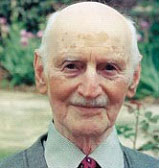
We came from different backgrounds. My parents were very educated and religious. That was different at the Franks.
I really don’t know what the occupation of Mrs. Frank was. She was a sort of religious. Mr. Frank was raised as my father was and stayed like that. He knew nothing about being Jewish.
He was a very pleasant man and could get on with young people very well. After the war many young people wrote to him, especially Germans and he thought that it was very important to answer all letters himself. He had a secretary but really wrote all answers personally. He was very nice to us. When I learned how to ride a bicycle Mr. Frank ran behind me, not my father. When I was at the Franks’ at night I never could eat there, because it was not kosher. I went to the Franks often and when they ate Mr. Frank always drank beer. My father never did.
We do not know what she wrote, because the dairy that everyone knows starts 3 weeks before the Franks went into hiding. And we are not at that period yet. Perhaps there was another dairy but nobody found it. Margot wrote a diary too, but that one hasn’t been found as well.
My mother really described Anne very well. She said: “God knows everything, but Anne knows it better”. And that is how it was. A girl who thought that she knew everything better.
She always played with her hair. She was a nice girl, she looked like a small kitten. It was great to be here friend and it was never dull. We had a normal life, on a school with christian and Jewish children and on Sundays we went to the office of Mr. Frank. We played with the rubber stamps and we telephoned from room to room. There was a telephone on every desk (the office of Mr. Frank is now the Anne Frank house).
On the 10th of May 1940 Germany invaded The Netherlands. In the beginning it was not as it was in Poland. The Germans first took the time to look if the Dutch would help them.
In October 1940 my little sister was born. My mother always dreamed of a big family. I was already 12 years old, so it didn’t went as she hoped. From this moment on we didn’t go to the office every Sunday. Anne and Margot came to our house. We looked how my mother bathe my sister and the 3 of us took her outside.
In that year the laws against the Jews started . We had to wear a yellow star and Jewish children had to leave their school and went to a Jewish school. One third of the population of Amsterdam was Jewish. School were opened for Jewish children with Jewish teachers. We could not do anything anymore. The swimming pool was forbidden as was playing tennis and riding on a horseback. We were not allowed to ride the streetcar of the bus, we couldn’t drive a car or go by train, a ship, everything was forbidden. In the park there were signs saying “Dogs and Jews are not allowed”.
We only could visit other Jews. Anne and I had a christian orthodontist and we were not allowed to go there. Christians could not go to Jewish doctors. And you could only go out between 6 in the morning and 8 at night.
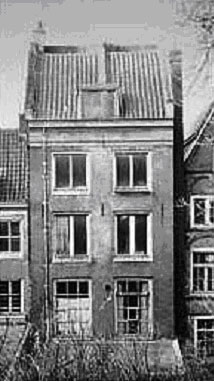
The SS made lists with names. I don’t know how they got them so accurate and every night after 8 pm, when everyone was at home, they came to get people out of their homes. They said: “We take you to a labour camp, get your luggage and come with us”. They did not say “We are going to gas you in Auschwitz”. If they would have said that we would all went into hiding and try to safe ourselfs.
The borders were closed since 1937/38, including the Swiss border. When people tried to flee to Switzerland and they were found in the vicinity of the border they were send back to Germany. It was only possible to flee over sea to Spain and then to Palestine, but in Palestine the British, who ruled Palestine in those days, would not let us in. It was extremely complicated.
We had a party at school in June 1942 because we went to the next class. Anne and I had to take a math-test again in the beginning of the summer break. After that I went to her house to play, and that was the only thing we were allowed to do. When I rang the doorbell the Dutch-Jewish subtenant, who lived in the attic, came downstairs and he looked at me surprised and asked: “What do you want?” I said “You know what I want, we have our holidays and we want to play outside”. He said: “Don’t you know that the Frank family went to Switzerland?”
That is where the grandmother lived, Mr. Franks’ mother. They spread this rumour because they thought nobody would look for them. Mr. Frank prepared the hiding. We didn’t know that, you could not speak about these things. The Germans could torture you and then you would say things you didn’t want to. What you didn’t know, you couldn’t tell.
In Juli there was something new again. Whenever there was something new, things became worse for us. Because had to know what was going on we had to subscribe to a Jewish newspaper. Than nobody could say that they didn’t know . Everything we had to know was in this paper. And what happened? There was a summon in the paper.
Everybody of 15 and 16-years had to report for forced labour. Up until that moment it were always 25 to 45-years old people who were summoned, and not 15 and 16-years old. One of my friends, Wolfgang, who was 15, came to me and said: “Good that we see each other. I want to say goodbye.” I asked him why he wanted to say goodbye but I understood that he was summoned too. Margot had received such a summon too, but in Annes diary she writes that Mrs. Frank told the girls that the summon was for Mr. Frank. Margot was 16 back then.
Most youngsters did obey this summon. The parents received a list of things the kids had to take with them and when the list stated 5 towels they packed 5 towels and let there children go. They hoped that the children only had to work in Germany.
Perhaps only a old grandmother and a baby were left. When they got their summon, the parents would say: “But our son is already working in Germany, is that not enough?” Of course it wasn’t and within a year grandmother and the baby were gone too.
What happened we didn’t know. They only said that they went to a work camp in Eastern Europe. 4 to 6 percent of the Jews didn’t comply and amongst them was Mr. Frank. Mr. Frank said: “I will not send my 16-year old daughter to somewhere on het own. We either go together, or nobody goes”. And that was on the day they went into hiding. The hiding-place was not ready yet, but something like that can never be ready.
And my friend? He went. Young people were send to Mauthausen. Mauthausen was one of the worst camps. There was a quarry and terrible steps. Giant rocks had to be carried by young people up and down those steps until they could not go on anymore. Than they got a kick in the butt and they fell down those steps and that was the end of it. In this camp Annes friend Peter died on the 5th of May 1945. On the 8th of May this camp was liberated by the Americans.
After about 6 weeks everybody got a letter which stated that their son or daughter had died. All 400 healthy youngsters, 15 and 16 years old, died within a few weeks. The pain was dreadful. But it was too late. Only a few returned from Mauthausen.
As we know now, the Frank family saved money for 2 years in order to go into hiding. They couldn’t go to Switzerland. You couldn’t go there via Germany. It was possible via Belgium, France and over the mountains but only a few succeeded. They thought it was better to stay in Holland. They lived for another 2 years. At home I always said: “my friend had to go. The Franks are in Switzerland, why are we here?”
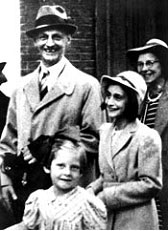
I told you my mother dreamed having a big family. But now we were in different circumstances. In 1942, the Germans, when they came to get you, left pregnant women with their family. In 1943 they were deported too and in 1944 there was no one left. They were either on transport or in hiding.
We were still at home. Probably the pregnancy of my mother saved our lives. We would have been deported otherwise. My mother was due on October 19. There were complications and my mother and the baby died during birth. Our protection against deportation was gone and my father tried to arrange that we could stay at home.
We had an id-card with a big J in it, which meant Jew. If you got a special stamp it meant that the Germans needed you in your town. But who do they need? Seamstresses for instance, who made the uniforms for the army. That’s what the needed and that is how we got this stamp and we could stay at home.
My uncle, who lived in Switzerland (he went to Switzerland after Kristalnacht), could buy a passport of a neutral country in South America. We (my grandparents, parents, sister and myself) got passports of Paraguay and that helped us in the beginning. But there was something else that helped us, even more important. There were negotiations between Germany, England and Switzerland. The Germans wanted to exchange a group of 4000 – 5000 Jews against German prisoners of war with England. That why Germans wanted to safe a group of Jews. That was the Palestine-exchange-list. Everybody wanted to be on that list. This list was only for people who had children, parents or a brother or sister in Palestine and from whom relatives were stuck in Holland. We were put on the 2nd list. That was very important and without stat stamp I wouldn’t have been here today. It didn’t help my father and grandparents but it did help my sister and myself. Thank God.
On June 20, 1943, Holland was free of Jews, as the Nazis called it. But still there were people like us in Amsterdam. People with a special stamp. The Germans closed the whole Rivierenbuurt. The police arrested everybody with a stamp like we had. So we were arrested too.
They went from door to door. We had a very nice, catholic German neighbour. She lived in the house below us ever since my mother died. She had a son as old as my sister and she always invited is to play in the sandbox. That was forbidden. My father was always looking out of the window to see of there was no danger, for instance a German truck who held a round-up, a razzia. If that was not the case we could go downstairs and play. This woman once asked a German soldier who was waiting during a razzia near the truck: “Hey, can’t I go with you?” The soldier snapped at her and said: “You Dutch christian, are you not ashamed as you want to help Jews? She replied and said: “I am a German christian and I am never ashamed.”
Later this neighbour send us a parcel. In this parcel was food, what we weeded badly and a book. That was wise because you needed a book. Professors took paper, pencils and books with them. I had to pack everything on my own and didn’t have the thought of taking a book with me. This book was about the English Florence Nightingale during the Crimean War. I read this book several times. Besides my prayer-book this was the only book I possessed.
They took us by truck to the Central Station and a cattle-train waited for us. That train took us to Westerbork.
There was an orphanage in Westerbork. Why an orphanage when they want to murder us? That is very simple. In an ordinary house you cannot hide yourself if you have small children. Often they brought the children to farmers in the countryside. Everybody hoped no-one would notice. The children got fake id-cards because an id-card with a J on it is not very smart if you want to go into hiding. But the Germans soon saw the difference between fake and real id-cards. A lot of id-cards were good forgeries and those people were lucky; but when the cards were not forged professionally then there were children without parents. These children first were brought to Westerbork until they decided what they wanted to do with them. The Jewish registration put all of these children of the Palestine-exchange-list.
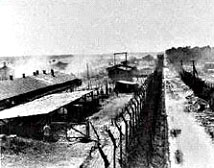 That is why my father, my sister and myself came to Westerbork and the leader of the orphanage, Mr. Birnbaum, asked my father where his wife was. My father knew Mr. Birnbaum, who also came from Berlin. My father said: “I don’t have a wife”. Mr. Birnbaum told my father that he was the leader of the orphanage and food was better there. Put your daughter in the orphanage, he said. That was the best my father could do. I worked there with the children and voluntary cleaned the toilets for 150 children. I could walk around freely, even in the evenings, and I could see my father every day. Always when my father was free of work he came over. Most of the times I was cleaning and he gave me strength.
That is why my father, my sister and myself came to Westerbork and the leader of the orphanage, Mr. Birnbaum, asked my father where his wife was. My father knew Mr. Birnbaum, who also came from Berlin. My father said: “I don’t have a wife”. Mr. Birnbaum told my father that he was the leader of the orphanage and food was better there. Put your daughter in the orphanage, he said. That was the best my father could do. I worked there with the children and voluntary cleaned the toilets for 150 children. I could walk around freely, even in the evenings, and I could see my father every day. Always when my father was free of work he came over. Most of the times I was cleaning and he gave me strength.
The Westerbork-camp was not that bad. We could have survived the war there. However, in the middle of the camp they had a railroad track. Every week the cattle-train came and 1000 persons had to go to, as they said, work in the east. The first ones that had to go were the convicts. But even babies, old people and mentally challenged people had to go. Convicts were the ones that had been in hiding. So Anne was a convict. Not always they had 1000 persons. We still had the special stamp but the ones without it were all gone. Persons with a stamp could not go on transport without a consultation with the commander of the camp and he decided who had to go. It is now November 1943 and again the train came and again there were not enough people to go. So they asked the commander: “Who has to go today too?” The commander decided that it was not necessary to have 40 exchange-lists, but only 2. We were lucky, we were on the 2nd list. When we would have been on the 3rd list we would have been transported this night.
I had a friend back then, Mareike. She was 9 years old and was found without a father or mother, but with her brother. She was my favourite and I kissed her goodnight every night. After the war I met her father and I told him what happened to his daughter. That night Mareike had to go and it was terrible. We helped to make a parcel for every child. They had to have something warm to wear. We didn’t know what was going to happen to them and where, but we hoped they would still need the warm clothing. The Rabbi blessed al children before the transport. Later we heard that all children, with their teachers, were gassed upon arrival.
Back then we knew nothing. We would not have believed it. It was the 1st time in history that they killed people with gas. There were rumours, but I didn’t hear them. People said: “The Germans are the people of Goethe and Beethoven. That gassing and murdering is nonsense. It can’t be, don’t believe it. You only have to work, and when the war is over, everything is back to normal. We didn’t want to believe it, we couldn’t believe it. Because the idea was so sick.
On February 15 the Camp-commander summoned all people who were on the 1st and 2nd exchange-list to him and all those with passports from the US, England and the neutral countries and he said: you will be transported to a beautiful exchange-camp, Bergen-Belsen”. “Why can’t we wait at home for the exchange?” we asked ourselves. But the next day a real train, so not a cattle-train, came to get us and we really thought there was a surprise for everybody. Everybody received a piece of bread in the train. My sister was taken from the hospital to this train, and so was my father and grandmother. After a few hours we arrived in Bergen-Belsen. SS guards with big dogs were standing there and that’s how we found out this camp was not that beautiful. Since that time I don’t like dogs. I don’t like small dogs and big dogs.
The first 7-8 months Bergen-Belsen was better than all other camps. We din’t know that, we only could compare that after the war. We arrived and we our heads weren’t shaven and we didn’t get a tattooed number on our arm. They didn’t take our luggage and that was important because that’s why we weren’t given prisoners’ clothing. So I kept everything I took with me. That were my personal belongings. And, really important, they didn’t separate us. In Auschwitz the men and women were separated – we stayed together.
There were barracks for men and barracks for women and children in the camp. No children were killed. My sister was older than 3 years and I was younger than 16 years and that is why I could take care of her and didn’t have to work. We always stayed together. Father was in the barrack for the men, grandmother was in a different barrack.
Almost every night, at least when we weren’t punished for something we didn’t do, the men could come over. No camp allowed that, except for Theresienstadt.
The 2nd miracle. My grandmother and father were isolated for 2 or 3 weeks. So they weren’t there and I had jaundice. We are in the new camp for only 2 days, with 150 people in a barrack and on the beds and than they said: “We have to isolate you tomorrow, otherwise you will infect all other people.” But what could I do with my sister? She was only 3 years old. I didn’t know what to do. What could I do? God really helped me – when you were on your one you really had less chance to survive. But I couldn’t say to anyone: “take care of my sister”. Everybody was busy with keeping their own family healthy and you can’t take care of a child you don’t know. And a child with a bandage smelling of pus isn’t that appealing. I really didn’t know what to do and I had to report on 8 o’clock the next morning. Then an older woman, who I knew from Amsterdam, looked at me and sees my despair and said: “perhaps I can help you.” She went and returned with a member of her family, e very reliable woman who had 7 children. 2 sons that were with her husband and 5 daughters, who stayed with her. I didn’t see them before that time.
My father always helped everybody and everybody knew that. He had even tried to get people off the train. The woman said: “your father always helps everybody. It is my turn now. And really, her daughter came to get my little sister on Wednesday morning. She took care of my sister for a month, visited me in the isolation barrack and told me how my sister was. In the mean time my father had returned too and he visited me and my sister after his heavy work. My sisters life was safed for the 2nd time.
The 3rd miracle was the next one: we came to Bergen-Belsen, an enormous camp and in the middle there was a street and on the sides of that street there were barracks. The kitchen was in one part and small houses were the SS-guards lived and on the other side you had the barracks with barbed wire.
When we came into the camp on February 15th we were brought all the way at the end of the camp. We didn’t see a lot of people, perhaps a 1000. During liberation where were 60.000 people in Bergen-Belsen. That were convicts, people with a start, people without one. With us Jews from Hungary came along. That were the only ones we could talk to, when you could speak Hungarian. At the end of the camp there were about 20 barracks. A part of them was filled with Jews from Saloniki, Greeche. In all those families who only spoke Greek there was a family who had lived in Berlin for two years, and they had known my father very well. This man helped my father to get better work. When he saw my sisters’ dirty bandage he went to his wife, who had an important position in the camp. She received twice a week a bowl of milk and a mug and distributed the milk. Children younger than 3 years received milk twice a week. My sister was 3 years and 4 months old, so there was no milk for her. He said to his wife that, if there was milk left, she should give it to this little girl. Perhaps they could safe her.
I was a fool, I left the jewelry that my mother had at home. That could have helped because all the women who had a 3, 4 of 5 years’ old went to her and begged her for milk. And they promised her things like warm clothes or a piece of bread or jewelry. I had nothing I could give and still I got the milk and it safed my sisters life because she would not have survived it without it.
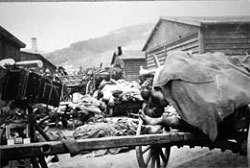 Now we come to a sad part. Back to Anne Frank. The Bergen-Belsen camp, which was reasonable in the beginning, became hell on earth. Why? The Americans started their invasion in France. They came from the west and tried with the British to siege Germany. The Russians came from the east. They were, thank God, quicker. The Germans understood that the Russians wanted to see what they had done in Poland and that is why they evacuated all camps, as far as they could.
Now we come to a sad part. Back to Anne Frank. The Bergen-Belsen camp, which was reasonable in the beginning, became hell on earth. Why? The Americans started their invasion in France. They came from the west and tried with the British to siege Germany. The Russians came from the east. They were, thank God, quicker. The Germans understood that the Russians wanted to see what they had done in Poland and that is why they evacuated all camps, as far as they could.
People who were very sick, as Mr. Frank was, were left behind. He stayed in Auschwitz and was liberated there. The others were send of terrible death-marches, walking or in open trains. In Oranienburg, Sachsenhausen, there is still a street with a sign that says: “this is were the death-marches came through”. Many came to us, to Bergen-Belsen. That is far from Auschwitz. We saw the people, but we didn’t know who they were and where they came from. We saw stacks of corpses. Why did these people die this fast? Not because of the undernourishment, but they often had lice and the lice were infected with typhoid. When you don’t have any medicine, almost nothing to eat, and when you get typhoid that is all you need to die. A louse needs a warm body and as soon someone died the lice went to look for a new host.
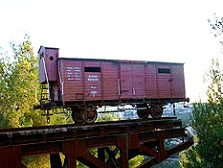 When you are living so closely together (we had bunk-beds, 2 above each other, later on it was 3 above each other) and when all barracks are connected, when they have no windows, only open doors and when there is only cold water, then you get lice and, as said before, all these lice were infected. So, even though the people of the death marches were in a different part of the camp, the lice came over and many of us died of typhoid.
When you are living so closely together (we had bunk-beds, 2 above each other, later on it was 3 above each other) and when all barracks are connected, when they have no windows, only open doors and when there is only cold water, then you get lice and, as said before, all these lice were infected. So, even though the people of the death marches were in a different part of the camp, the lice came over and many of us died of typhoid.
How often do you think we had a hot shower? Twice a year! We have a very important holiday in February. On this day we fast and we can do nothing. On this day we were sent to the showers. Everybody wanted to have a shower, but not in February. This shows how devilish those people were. They really thought about how they cold ruin anything you would look forward to.
The whole camp was packed with people. They died and there places were filled with newcomers from Auschwitz. On a day a group of 7000 women arrived. I can still remember that, because they were in a part of the camp next to us. Because all accommodation was filled a large tent was put up and that was their housing. On a cold windy night in November 1944 this tent was blown away and those women where sitting in the water and the mud.
It was our turn to make space available and our 20 barracks were ordered to vacate 10 barracks for these women from Auschwitz and that is why we got bunk beds 3 stories high. Until that moment we still had long tables and benches, but they were taken out of the barracks. We had to sleep with 2 persons in 1 bed. I was lucky. I could sleep together in 1 bed with my sister. It could have been a stranger…
That is how it came that these people were so close to us. We wanted to know who they were, and where they came from. What were their experiences? Perhaps they had seen people we knew…
But getting into contact was not possible yet. Why not – well, the Germans erected a large fence in to prevent you from looking to the others, they filled the fence with rush and reed. Looking over the fence was not possible too because of the watchtowers and the guns. It was extremely dangerous to go to the fence and to talk through it. Secondly we couldn’t understand them. It was like Babels Tower. They spoke Polish and Czech, and we came from Greeche, Holland, Germany and a few from France and Yugoslavia. So in the beginning we didn’t went to that fence. It took until February 1945 before we made contact and we found out that in this group there were about 40 women from Holland and a few from Poland and Czechoslovakia. They came closer to the fence and they heard that Dutch was the main language in our part of the camp. In February someone I knew said to me: “you know, your friend Anne Frank is in the camp next to us”. I couldn’t believe it. Anne is where? Anne should be in Switzerland with her grandmother. And now she is here and she is in a worse condition than I am?
At night I went to the fence and carefully called her name. I was lucky. Mrs. Van Pels heard me (she is called Mrs. Van Daan in the diary. Anne changed the names. She is Peters’ mother, and they where in hiding with Anne). She came to the fence and told me who she was. I told her my name. We only had a few minutes and it was quite dangerous there, and she asked: “Ah, you want to speak to Anne? I said: “Of course I want to speak to Anne.” Before she went she said: “I can’t sent Margot over, she is too weak. She can’t walk to the fence anymore.”
I stood in the cold and I waited. After a few minutes Anne came over. Our reunion was so sad. At first we cried together and I asked: “how did you get here? I had hoped you where in Switzerland.” And she told me everything. That they never went to Switzerland. That they were in hiding in the office. That they were betrayed and deported to Auschwitz. Anne told me what Auschwitz meant. She told me about the gas-chambers. Then I told her my mother and the baby died during birth. That my father was very ill (he died one week later, on February 25), that my sister was healthy. She told me she had no-one anymore. “I am alone, I am the only one left”. She asked me if I could help her to get some food. That she was alone was not true. But she didn’t know. She was not together with her father but she knew that in Auschwitz everybody younger than 15 and older than 45 were gassed upon arrival. Her father was 56. She was certain that he was dead.
At the selection there was always Dr. Mengele or another SS-man. They stood on a platform. They saw at least 1000 people passing by and never asked anyone how old they were. He looked and pointed with his finger. Somebody could be 30 and ill and had to go to the left to the gas-chamber. Mr. Frank was 56 and looking strong. They had been in hiding and got food there. He lived. But Anne didn’t know. Because mother had to stay in Auschwitz when Margot and herself were send to Bergen-Belsen she was certain that everybody was dead. But only her mother had died. Later on they found out that she died around January 6 of weakness.
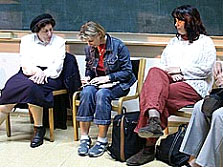 On our side of the fence there was also no food anymore. The Red Cross was there, but until February 1945 they didn’t give any food. Perhaps the other received something from the Red Cross, but we didn’t.
On our side of the fence there was also no food anymore. The Red Cross was there, but until February 1945 they didn’t give any food. Perhaps the other received something from the Red Cross, but we didn’t.
In February 1945 we got a very small parcel, a little bit bigger than a book. There was some knäckebrot in it, some dried prunes and these kind of things. So I said: “Anne, come over in a few days, I will see what I can organise”. Everybody gave me something. Socks, gloves and knäckebröd. So I came over with a small parcel and I called for Anne. Then I heard her on the other side. I said: “Watch it, I will trow it over the fence.” Then I heard her call names en crying. On the other side where hungry women everywhere and I couldn’t see them because of the hight of the fence. Another woman caught the parcel, ran away with it and didn’t give it to Anne.
First I had to calm her down and I said to her that we would try again. And so we did and this time she caught the parcel, I know for sure. That was the last time we spoke to each other, I couldn’t see her. On February 25 my father died and in that week I didn’t leave the barrack. When I came out, all was empty. At the end of the war the Germans replaced all prisoners. I didn’t knew where they took Anne.
Now I make a leap in time. 3 days before the British liberated the camp I was put in a train. With thousands of cattle-carts. We were liberated at Tröbitz (near Brandenburg) by the Russians and we lived there for a while.
After 2 months the Americans came to get us with a train from the Red Cross. We were brought to Leipzig and from Leipzig to Holland. Near the border I stayed in a hospital.
Mr. Frank came to visit me there. I said: “Perhaps your daughter is still alive in Germany. I haven’t seen her, but I did speak to her. That was in February, and it is only August now. But he suspected that he wouldn’t see his daughters anymore.
Mr. Frank helped me in December 1945 to get to my uncle in Switzerland. No one was allowed to go to Palestine. The British prevented that. Palestine was British mandate-territory. Many from the camps did try, with old ships that were bought by the American Jews. But most of the ships sank or the British entered them, brought the refugees to Cyprus where the were locked up in camps with barbed wire. My uncle didn’t want that for me. I went to school in Switzerland for 1 year and lived with my uncle. Then he came with a certificate and the British would let me into Palestine. My sister stayed with my uncle, she came to Israel in 1949. I asked her if it was okay that I brought her into Israel. She didn’t like it, but later on it was good. She finished school in Israel and became a teacher. 1.500.000 children died with Margot and Anne. Children who never did any harm to anyone. Let that be a lesson. People have different religions and colours, yet must try to live in peace with each other. I say that and it sounds ridiculous, because we are at war right now over here (2e intifada), but someday it will be peace. This was what I wanted to tell you. When I speak to Jewish groups my last sentence always is: “don’t forget to help us to build this small country (Israel), because it all we have”.
Translation from “Zukunft Braucht Herkunft “, historyproject of JAM; translation German – Dutch and Dutch – English: Rob Snijders, January 2008
